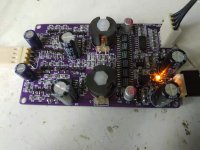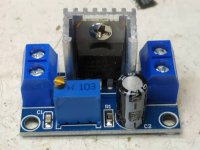you draw faster than Miro now ? Lol 😉
@abraxalito : is it just about having more current output ?
Would it suffice to sound better than their good TDA1541 ? I know a guy here from germany made a good DAC with 32x PCM56 IIRC... ten years ago ! John from Ecdesign measured // TDA1541, TDA1543 and conclude it arms more than it saves ! Not a so good trade-offs cause there are too much difference between dac chips batch according to him.
Well the ears are the only judge at the end.
@abraxalito : is it just about having more current output ?
Would it suffice to sound better than their good TDA1541 ? I know a guy here from germany made a good DAC with 32x PCM56 IIRC... ten years ago ! John from Ecdesign measured // TDA1541, TDA1543 and conclude it arms more than it saves ! Not a so good trade-offs cause there are too much difference between dac chips batch according to him.
Well the ears are the only judge at the end.
Last edited:
A batch of TDA1387’s are on the way.....😉
Was it you who bought 2 22mH inductors from Mouser a day or so ago? If not its an interesting coincidence their stock decremented by two just after I mentioned them here 🙂
@diyiggy - it is mostly about having more current. To get a better SNR in the analog stages we either need more signal or less noise simplistically speaking. The noise element is pretty well fixed by the noise of the opamps so that only leaves more signal as a way to increase performance.
Its not just more current though, the fact that the current is summed from individual sources leads to a degree of DAC chip noise cancellation.
Was it you....
Nope, I will wait until your satisfied with your Kubelik parts selection before I order anything else. 😉
BOM is on the way. Mouser BOM will be slightly different from my Taobao one as some alternatives are cheaper on Mouser - for example OPA1642 is cheaper than ISL28210 there.
r2 PCBs arrived this morning so I'd better get soldering 😛
r2 PCBs arrived this morning so I'd better get soldering 😛
Mouser BOM ...
I have all Mouser part numbers in the BOM now, the price works out just under $27 (plus shipping). To that needs adding the non-Mouser parts which are TDA1387s and the PCB.
DAC chips and PCBs are going to have minimum quantities to order - so the final price depends on getting a group together to share. But assuming a group buy I'd guess the parts price won't total more than $32. Shipping extra of course.
Or alternatively buy a kit from me which will include everything 🙂
Or alternatively buy a kit from me which will include everything 🙂
Cheers!
How about waiting a tad for the GB, weren't you still finalising the best sound options re parts, number of chips etc.?
Is this DAC in its current iteration now the best sounding one of your range, replacing the others?
Many thanks!
Claude
How about waiting a tad for the GB, weren't you still finalising the best sound options re parts, number of chips etc.?
Is this DAC in its current iteration now the best sounding one of your range, replacing the others?
Many thanks!
Claude
I'm not planning a GB, that's up to interested parties to organize if they want.
Its not 'the best sounding' no its more of it being a different flavour to the Deca DAC. For 'the best' DAC you'll need to wait for the next design which will be considerably more complex (and hence expensive).
Its not 'the best sounding' no its more of it being a different flavour to the Deca DAC. For 'the best' DAC you'll need to wait for the next design which will be considerably more complex (and hence expensive).
Many thanks, sorry for my confusion re GB.
Let's see the next design aswell and pick up one of the 3 - I have plenty time to try one to assess this tech for my second system planned next year (when house is built hopefully).
Many thanks again for all this
Claude
Let's see the next design aswell and pick up one of the 3 - I have plenty time to try one to assess this tech for my second system planned next year (when house is built hopefully).
Many thanks again for all this
Claude
r2 PCB successfully sings
First r2 PCB built up and playing music. Beautifully if I may add 🙂
There's no on-board PSU with Kubelik, it needs a quiet supply at 20V (current consumption TBD) which I supply with a modified LM317 board I bought from Taobao. These boards are also available on Amazon, with mixed reviews. Its true a few don't work, sometimes the LM317 needs replacing. But they are super-cheap.
I modify them by removing the multiturn preset and in its place I solder a couple of SOT-23 zener diodes in series to give me the output voltage I want. In this case, a 10V and a 9.1V zener gives a reference voltage of 19.1V and the output voltage is 1.25V higher than that, i.e. 20.4V roughly. In turn, the reg board is fed from a 24V wall-wart (which itself contains a 7824 reg).
First r2 PCB built up and playing music. Beautifully if I may add 🙂
There's no on-board PSU with Kubelik, it needs a quiet supply at 20V (current consumption TBD) which I supply with a modified LM317 board I bought from Taobao. These boards are also available on Amazon, with mixed reviews. Its true a few don't work, sometimes the LM317 needs replacing. But they are super-cheap.
I modify them by removing the multiturn preset and in its place I solder a couple of SOT-23 zener diodes in series to give me the output voltage I want. In this case, a 10V and a 9.1V zener gives a reference voltage of 19.1V and the output voltage is 1.25V higher than that, i.e. 20.4V roughly. In turn, the reg board is fed from a 24V wall-wart (which itself contains a 7824 reg).
Attachments
Nice work Richard!
Are those inductors hand wound? Is the Mouser pre-made inductor option as good?
Are those inductors hand wound? Is the Mouser pre-made inductor option as good?
Thanks Vunce! Yes, well I wind the winding machine by hand. 371 turns of 0.13 wire.
I think the Bourns ones from Mouser are close enough, the Q looks rather similar based on the DCR. Though there's only the max DCR in the DS, I'm assuming the typical DCR is a bit lower.
I think the Bourns ones from Mouser are close enough, the Q looks rather similar based on the DCR. Though there's only the max DCR in the DS, I'm assuming the typical DCR is a bit lower.
Ok, thanks for the info. After my Kubelik is powered up and healthy, looks like the hand wound option could be an upgrade for the “easy” inductors.
I think a better upgrade (though a bit wild to implement) would be to stack another 6 TDA1387s on top of the 6 already there and substitute lower noise opamps (maybe OPA1612?). This would also need an inductor change but should give a higher SNR.
I've built up two r2 Kubeliks now and on the 2nd one I have been playing a bit with opamps - some more are on order to test my hypothesis further that noise is the crucial issue in this circuit.
With two Kubeliks its possible to create a balanced DAC, by feeding the same I2S to both but running one of them inverted in the digital domain. The outputs are then R+,R-,L+ and L- which effectively doubles the output voltage just like bridging an amp. The difference between a bridged DAC and a bridged amp is that we have control over the load impedance (unlike with a speaker, where its fixed) so a bridged/balanced DAC calls for an amp with 6dB lower voltage sensitivity. Not to mention the ability to handle a balanced input.
Fortunately with my latest revision of my monoAMP design I have a suitable vehicle - the EE35 input transformer can accept more turns on the primary, through using thinner wire. Initial listening is promising, sounds like the dynamics took a step up 😀 So it sounds like its a viable way to create a 12-chip DAC for those who don't want to get 'down and dirty' with modding.
With two Kubeliks its possible to create a balanced DAC, by feeding the same I2S to both but running one of them inverted in the digital domain. The outputs are then R+,R-,L+ and L- which effectively doubles the output voltage just like bridging an amp. The difference between a bridged DAC and a bridged amp is that we have control over the load impedance (unlike with a speaker, where its fixed) so a bridged/balanced DAC calls for an amp with 6dB lower voltage sensitivity. Not to mention the ability to handle a balanced input.
Fortunately with my latest revision of my monoAMP design I have a suitable vehicle - the EE35 input transformer can accept more turns on the primary, through using thinner wire. Initial listening is promising, sounds like the dynamics took a step up 😀 So it sounds like its a viable way to create a 12-chip DAC for those who don't want to get 'down and dirty' with modding.
How many chips would your next "best-sounding" DAC have? I'm very interested in the balanced design. Also, could you share the link you bought the chips from?
I will build the first prototype of my 'best DAC' with 24 chips and go from there.
I bought my DAC chips many years ago from a buddy in Guangzhou, didn't buy online. But there are plenty of sellers on Taobao, Aliexpress and Ebay.
By the way the 'balanced design' isn't a new design, its just employing two standard Kubeliks in balanced mode.
I bought my DAC chips many years ago from a buddy in Guangzhou, didn't buy online. But there are plenty of sellers on Taobao, Aliexpress and Ebay.
By the way the 'balanced design' isn't a new design, its just employing two standard Kubeliks in balanced mode.
Last edited:
- Home
- Source & Line
- Digital Line Level
- lingDAC - cost effective RBCD multibit DAC design

